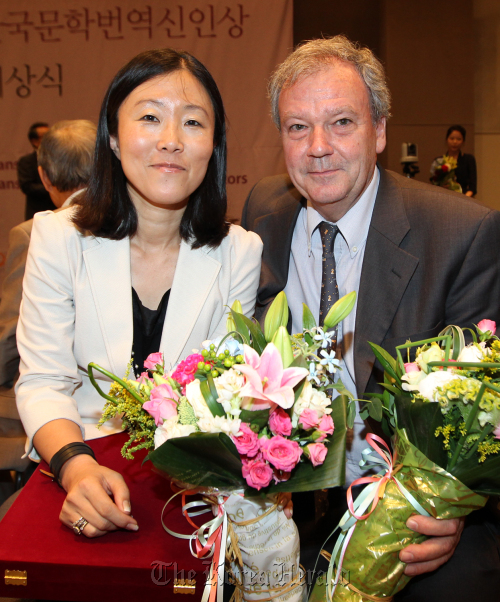Prof. Choi Mi-kyung wins Grand Prix at 10th Korean Literature Translation Awards
Ewha Womans University professor Choi Mi-kyung and former French diplomat-turned-translator Jean Noel Juttet together received the Grand Prix Prize at the 10th Korean Literature Translation Awards, a biennial competition organized by the Korea Literature Translation Institute, for their co-translation work at Korea Press Center in Seoul, Thursday.
Choi and Juttet, who have been translating together as a team since 1995, received the prize for their 2009 work, “Shim Chong, fille vendue,” a French-translated edition of Korea’s renowned author Hwang Sok-yong’s novel “Sim-cheong.”
Inspired by one of the most well-known folktales of Korea, Hwang’s novel tells the tragic life story of a young Korean woman in the 19th century who gets sold to China.
“As a translator I find it most fulfilling when my work is regarded as a work of literature, instead of a work of translation,” Choi told reporters at a press conference held prior to the award ceremony.
Choi, who is also a veteran Korean-French interpreter for international conferences and seminars, said her interpreting experience helps when she translates Korea’s literary works into French.
“Working as an interpreter requires immediacy,” Choi told reporters. “So the interpreting experience made me work faster when I translate. It also has helped me to find more natural expressions.”
Ewha Womans University professor Choi Mi-kyung and former French diplomat-turned-translator Jean Noel Juttet together received the Grand Prix Prize at the 10th Korean Literature Translation Awards, a biennial competition organized by the Korea Literature Translation Institute, for their co-translation work at Korea Press Center in Seoul, Thursday.
Choi and Juttet, who have been translating together as a team since 1995, received the prize for their 2009 work, “Shim Chong, fille vendue,” a French-translated edition of Korea’s renowned author Hwang Sok-yong’s novel “Sim-cheong.”
Inspired by one of the most well-known folktales of Korea, Hwang’s novel tells the tragic life story of a young Korean woman in the 19th century who gets sold to China.
“As a translator I find it most fulfilling when my work is regarded as a work of literature, instead of a work of translation,” Choi told reporters at a press conference held prior to the award ceremony.
Choi, who is also a veteran Korean-French interpreter for international conferences and seminars, said her interpreting experience helps when she translates Korea’s literary works into French.
“Working as an interpreter requires immediacy,” Choi told reporters. “So the interpreting experience made me work faster when I translate. It also has helped me to find more natural expressions.”

Choi said translators “hold great responsibility” in today’s world and she is not particularly pleased with the current criticism on Korea’s translated works from earlier years. “It’s hard to find countries like Korea where people rely so heavily on translations for foreign contents,” Choi told reporters. “Translators in the earlier years worked hard in spite of the hardships of the time period and lack of recourses.”
Juttet, on the other hand, stressed their way of co-translating is very effective in many ways. “So far, I think there are a very few people who can understand and write in both French and Korean flawlessly,” he told reporters.
“Translation is all about breaking down a language into pieces and putting them back together in a completely new form. So two people ― one with Korean background and the other of French ― can produce a translated text that practically reads like a French novel while not losing the initial intention of the Korean author.”
According to Juttet, some 8,000 copies of “Shim Chong, fille vendue” have been sold in France since its publication in 2009. “Considering it’s a foreign novel translated into French, the book has been doing quite well,” he said.
Scholar Yang Han-ju and German translator Heiner Feldhoff were selected as runner-up for their Korean-German co-translation of Korean author Kim Young-ha’s “Black Flower.” Their German edition, “Schwarze Blaume” was published in Germany in 2010.
Yang said while she tries make the translated text as “German” as possible, she still wants to leave Korean sentiments for her readers to enjoy. “I want my text to feel foreign to a certain extent,” she told reporters. “As much as I want it to sound natural for the German readers, I still want to make it clear that the book was written from somewhere else, that it is a product of a foreign world.”
Yang also said she’s been noticing some Korean authors writing in sentences that are easier for translations. “I think they take it into their mind that the book might be translated into another language one day,” she said. “Yet I personally think writers should not give up the original qualities of their mother tongue.”
American scholar John Holstein, who currently teaches at Sungkyunkwan University in Seoul, also received the runner-up prize for his Korean-English translation of “A Moment’s Grace,” a collection of short stories written by Korea’s highly acclaimed authors.
Holstein said among many others, Korean humor is the most difficult to translate. “One needs to be aware of the social and cultural context of humor in order to understand it. It’s hard to deliver that into a foreign language,” he said.
While the Grand Prix prize winners received $20,000, runner-ups were given prizes of $10,000. On the same day, a total of eight winners of the 10th Korean Literature Translation Contest for New Translators were also each awarded with $500 prize money.
By Claire Lee (dyc@heraldcorp.com)









![[KH Explains] How should Korea adjust its trade defenses against Chinese EVs?](http://res.heraldm.com/phpwas/restmb_idxmake.php?idx=644&simg=/content/image/2024/04/15/20240415050562_0.jpg&u=20240415144419)









